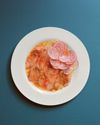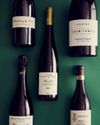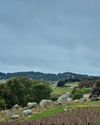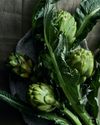
By mid-morning the cobbled lanes of Bernkastel are overtaken by travellers marvelling at the town’s medieval marketplace and gabled half-timbered houses. The scene is so chocolate-box, so fairytale, it might have been the setting for the Brothers Grimm fantasy about a couple of naughty kids and a cannibalistic witch. The weinstuben (wine taverns) are full, the strudel shops busy. Just a short, steep walk from the selfie-snappers lining up at the 17th-century town hall, however, and not far from the remains of the Graach Gate, built-in 1300, is a little vineyard unnoticed by the crowd below. I pick an alley and climb to a narrow road flanked by a high stone terrace. Butterflies flit, birds sing, and the sun shines on the most valuable vines in Germany, a vertiginous south-west slope of Mosel Valley Riesling with roots deep in sharp blue Devonian slate.
This is the Bernkasteler Doctor, a mere 3.26 hectares of rock and vine – ungrafted, some planted a century ago. It’s hard to imagine the soil is much different from that of surrounding plots, but this one certainly benefits from its starring role in a 14thcentury legend. As depicted in carvings on a fountain in the village, the region’s grandee, Archbishop Boemund II, developed a sickness that many tried to treat but no one could cure – until he was given a good dose of wine from this plot. He made a miraculous recovery, and the revived prelate conferred the name “doctor” on the vineyard. The sentiment seems to have spread – quite a few Mosel wineries bear the name doctor – but this one is the most famous. Its status is nudged along by exclusivity – the vineyard has been owned by just two families, named Thanisch and Wegeler, for 130 years – and intrigue, after the discovery of a secret stash of very old bottles hidden in a crypt from the plunderers of World War II.
This story is from the {{IssueName}} edition of {{MagazineName}}.
Start your 7-day Magzter GOLD free trial to access thousands of curated premium stories, and 9,000+ magazines and newspapers.
Already a subscriber ? Sign In
This story is from the {{IssueName}} edition of {{MagazineName}}.
Start your 7-day Magzter GOLD free trial to access thousands of curated premium stories, and 9,000+ magazines and newspapers.
Already a subscriber? Sign In

From personal experience
Former Hope St Radio chef ELLIE BOUHADANA invites you to gather your loved ones and enjoy an evening of good food and laughter with recipes from her new cookbook, Ellie's Table.

Kimberley Moulton
Kylie Kwong celebrates the individuals helping to grow a stronger community. This month, we applaud the international curator and Yorta Yorta woman who is shining a light on First Peoples.

Tom Wallace
We share a drop with the head winemaker for Devil's Corner, Tamar Ridge and Pirie Sparkling, a master of cool-climate grapes.

Best in class
The top drops to keep an eye out for on wine lists (and why they're worth the splurge)

A taste of refuge
Fleeing war and persecution, Australia's new arrivals push our food culture forward. DANI VALENT explores the contributions of the country's refugee communities.

BE OUR GUEST
Inspired by the sense of place conjured by Europe's Michelin-star restaurants, local restaurateurs are expanding their hospitality remit to include accommodation

Barcelona BUZZ
A popular drawcard for digital nomads and expats alike, the Catalonian capital offers equal parts sophistication and fun. Here, DANI VALENT discovers the latest dining hotspots.

HEATHCOTE BOUND
MICHAEL HARDEN hits the road to explore regional Victoria's Heathcote, home to this year's Best Destination Dining and a host of other delights.

The art of...relishing restaurants
Does working in hospitality make someone a better or worse diner

HEART AND SOUL
Not a vegetable but rather a flower bud that rises on a thistle, the artichoke is a complex delight. Its rewards are hard won; first you must get past the armour of petals and remove the hairy choke. Those who step up are rewarded with sweet and savoury creaminess and the elusive flavour of spring. Many of the recipes here begin with the same Provençal braise. Others call on the nuttiness of artichokes in their raw form. The results make pasta lighter and chicken brighter or can be fried to become a vessel for bold flavours all of which capture the levity of the season.